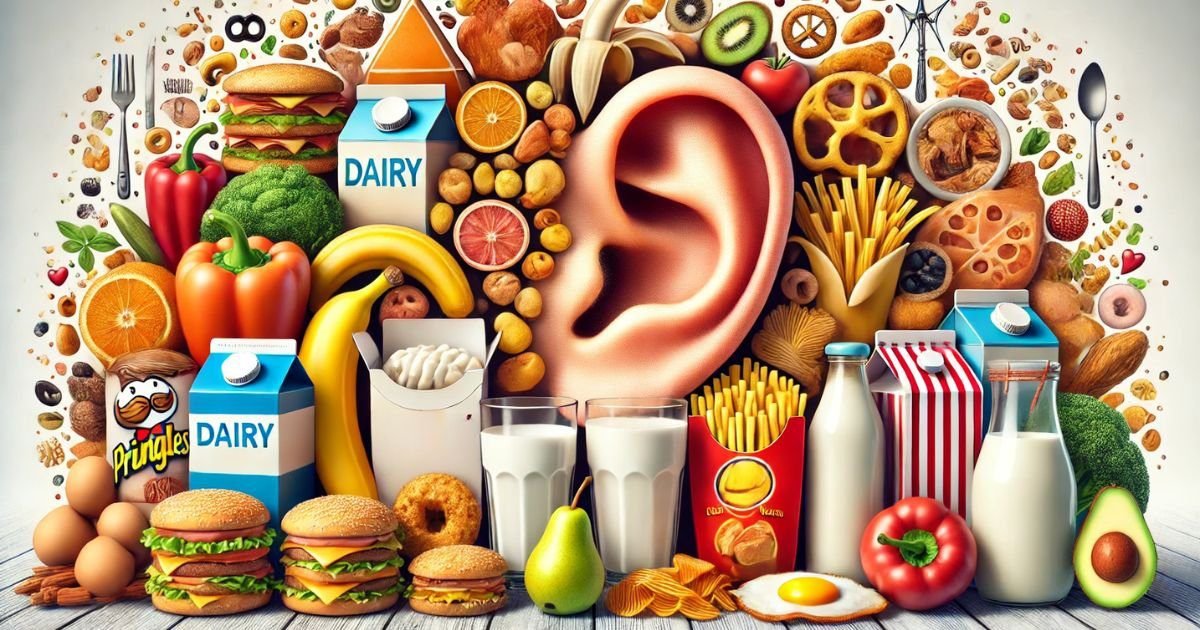Foods That Cause Ear Wax are often overlooked as a significant factor influencing ear health. While many people associate earwax buildup with poor hygiene or ear infections, the foods we consume play a crucial role in how much wax the body produces. This substance, referred to as cerumen, helps safeguard the ear canal from dust, debris, and bacteria. However, when produced in excess, Foods That Cause Ear Waxcan cause discomfort and possibly lead to hearing issues.
Understanding how different foods impact earwax production is essential for maintaining good ear health and preventing unnecessary blockages or buildup. This article explores how specific foods can influence earwax production and offers insight into how you can manage your diet to promote healthy ear function.
What is Ear Wax and How Does It Form?
Ear wax, or cerumen, is a natural substance created by glands within the ear canal. Its primary function is to protect the ear from dirt, dust, bacteria, and other foreign particles that could potentially cause harm Earwax also aids in lubricating the ear canal, helping to prevent dryness and itching. It is a mixture of secretions from sebaceous glands, sweat glands, and dead skin cells. As the earwax moves through the ear canal, it gradually works its way out of the ear, carrying with it any trapped debris.
The process of earwax formation is influenced by various factors, including genetics, environment, and ear hygiene. Some individuals produce more earwax than others, and specific conditions can lead to an excess of cerumen. Knowing how earwax is produced can assist in managing its buildup and supporting overall ear health.
Foods That Cause Ear Wax: How Your Diet Plays a Role
Foods That Cause Ear Wax production are often overlooked as a key factor in ear health. Your diet can significantly influence the amount of earwax your body produces, as certain Foods That Cause Ear Wax may increase mucus and oil production in the body, contributing to excess earwax buildup. Here are some foods known to play a role in earwax production:
- Dairy Products: Milk, cheese, and yogurt can increase mucus production, leading to thicker earwax.
- Fatty and Fried Foods: Foods high in unhealthy fats can lead to increased oil production in the body, including in the ears.
- Spicy Foods: Spices like chili peppers may stimulate mucus production, affecting earwax consistency.
- Sugary Foods: High sugar intake can alter the viscosity of earwax, making it thicker and more difficult to clear.
- Caffeine: While caffeine is a diuretic, it may cause dehydration, affecting the consistency of earwax.
By understanding these dietary links, you can make informed decisions about your ear health.
Other Lifestyle Factors That Contribute to Ear Wax Production
In addition to diet, several lifestyle factors can contribute to increased earwax production. Hydration plays a significant role, as insufficient water intake can lead to thicker earwax, making it harder for the body to naturally expel it. Ear hygiene is another key factor—while cleaning ears too frequently or using cotton swabs can push wax further into the ear canal, inadequate cleaning can allow wax to build up over time. Environmental factors such as exposure to dust, pollution, or allergens can also lead to increased earwax production as the body attempts to protect the ears from harmful particles.
Additionally, stress can contribute to excess mucus production, which may affect Foods That Cause Ear Wax consistency. Lastly, certain health conditions like allergies or infections can cause the body to produce more earwax as a defense mechanism, increasing the likelihood of blockages or discomfort.
Must Read: Bebezomzom: Guide to Best Baby Monitors for a Peaceful Home
How to Manage Excessive Foods That Cause Ear Wax Naturally
Managing excessive Foods That Cause Ear Wax can be done through a variety of natural methods, helping to maintain healthy ears without resorting to invasive treatments.
1. Stay Hydrated
Proper hydration is essential for maintaining the right consistency of earwax. Drinking enough water helps prevent earwax from becoming too thick and difficult to expel naturally.
2. Use Natural Oils
Applying a few drops of warm olive oil, almond oil, or coconut oil to the ear canal can soften the earwax, making it easier for the body to naturally eliminate it. This method can be especially helpful if you feel like earwax is hardening.
3. Regular Ear Hygiene
Gently cleaning the outer ear with a damp cloth can help keep your ear canal free of excess wax. Refrain from using cotton swabs, as they may push the wax further into the ear.
4. Avoid Irritants
Reducing exposure to allergens and pollutants can minimize earwax production and prevent excessive buildup.
Conclusion: Managing Ear Health Through Your Diet
In conclusion, managing ear health through your diet is an effective way to regulate earwax production and maintain overall ear function. Foods that cause ear wax buildup, such as dairy, fatty foods, and sugar, can increase mucus and oil production in the body, leading to thicker and more stubborn earwax. By being mindful of your diet and making healthier choices, such as reducing processed foods, consuming more water, and avoiding excessive caffeine or spicy foods, you can help reduce the likelihood of earwax buildup.
Additionally, adopting proper ear hygiene practices and staying hydrated can support the natural cleaning process of the ear. Remember, if excessive earwax persists or causes discomfort, Foods That Cause Ear Wax is essential to consult a healthcare professional. A balanced diet combined with good ear care practices can significantly improve ear health and prevent unnecessary blockages.
FAQs: Foods That Cause Ear Wax and Ear Health
Q1: Can dairy products cause earwax buildup?
Yes, dairy products like milk, cheese, and yogurt can stimulate mucus production in the body, leading to thicker earwax. This may contribute to excess earwax in the ear canal.
Q2: How do fatty and fried foods impact earwax production?
Fatty and fried foods can increase oil production in the body, which may affect earwax consistency, making it thicker and more prone to buildup. Reducing these foods can help manage earwax levels.
Q3: Does sugar affect earwax production?
High sugar intake can alter the viscosity of earwax, making it thicker and stickier. This can contribute to the accumulation of earwax in the ear canal and cause discomfort.
Q4: Can caffeine contribute to earwax buildup?
Caffeine can lead to dehydration, which may affect the consistency of Foods That Cause Ear Wax, making it more difficult for the body to naturally expel it. Moderate caffeine consumption is advisable for ear health.
Q5: What lifestyle changes can help reduce earwax buildup?
Staying hydrated, practicing gentle ear hygiene, avoiding allergens, and reducing the intake of foods like dairy and processed sugars can help manage earwax production and maintain healthy ears.
Thanks for visiting Globalexpressinfo.com. Don’t forget to share it on Twitter.






